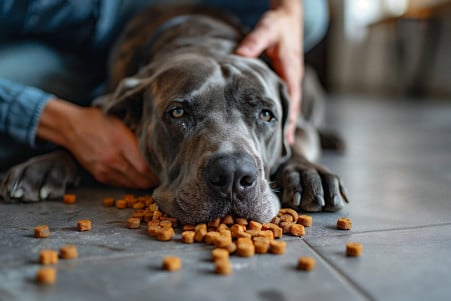Why Do Dogs Throw Up After Eating? Causes and Solutions
2 May 2024 • Updated 30 April 2024

If your dog has been throwing up after eating, there are a few different reasons that this could be happening, from eating too fast to more serious health concerns. One of the most common reasons for dogs throwing up after eating is gastrointestinal distress, which can be caused by a number of things including allergies, pancreatitis, bloat, or eating foods that are toxic or hard to digest.
To help you figure out what might be going on, we'll cover the most common causes of dogs throwing up after eating. Drawing on information from veterinarians and dog nutritionists, we'll also go over symptoms, ways to prevent the problem, and treatment options for each cause. This comprehensive guide will help you better understand why your dog might be throwing up after eating and help you know what to do next to make sure that they're healthy and happy.
Why do dogs throw up after eating?
Common Reasons for Vomiting After Eating
Vomiting after eating can be caused by eating too quickly or overeating, which can make it difficult for dogs to digest their food properly. According to The Farmer's Dog, this can be avoided by using a slow feeder or puzzle bowl, which will make your dog eat slower. Feeding your dog smaller, more frequent meals throughout the day instead of one or two large meals can also help prevent overeating.
Vomiting can also be caused by a sudden change in diet or the introduction of new foods, which can disrupt a dog's digestive system. Hill's Pet Nutrition suggests talking to your vet before changing your dog's food and gradually transitioning to a new food to avoid stomach problems. In addition, vomiting can be caused by food allergies or intolerances to ingredients like dairy, grains, or proteins, which can cause the body to try to get rid of the offending substances.
Stress, anxiety, or excitement around mealtimes can lead to vomiting by interfering with the digestive process. According to The Farmer's Dog, this can be caused by separation anxiety, changes in routine, or even the stress of feeling like they have to compete with other pets for food. Underlying medical conditions are another common cause - pancreatitis, gastrointestinal disorders, infections, or parasites can all cause vomiting after eating, according to Scollar Pet Care.
Whether it's a behavioral, dietary, or medical issue, it's important to figure out the cause of vomiting after eating in dogs. This list of common causes can help you figure out how to prevent and treat the issue that's causing your dog's vomiting.
How to Avoid Vomiting After Eating and Feeding Tips
The Farmer's Dog explains that using a slow feeder or puzzle bowl can help slow down eating and prevent overeating or eating too fast. A regular feeding schedule and routine can also help reduce stress and anxiety around mealtime.
When changing a dog's diet, Hill's Pet Nutrition suggests that the new food be introduced over a period of 5-7 days to give the dog's digestive system time to get used to it. It's also important to avoid feeding dogs table scraps or high-fat treats, which can be hard for dogs to digest and lead to vomiting.
Vetster notes that making sure dogs get enough exercise and playtime before meals can help increase their appetite and improve digestion. Pet owners can use these tips and feeding strategies to help prevent their dogs from vomiting after eating.
When to See the Vet
If your dog vomits more than once in a 24-hour period or if vomiting continues for more than a day, it’s time to see the vet, according to Paoli Vetcare. You should also call your vet if your dog is vomiting and has other symptoms like lethargy, loss of appetite, diarrhea, or blood in their vomit.
Puppies and senior dogs may need to see the vet sooner if they’re vomiting since they can become dehydrated or experience complications more quickly, says Airvet. And if your dog has eaten a foreign object, a toxic substance, or a large amount of a high-fat food, it’s best to get in touch with your vet to make sure they don’t need medical attention.
Even if your dog isn’t showing other symptoms, if they’re vomiting frequently or the vomiting comes and goes, it’s a good idea to see the vet to rule out potential health problems or gastrointestinal issues, according to BluePearl Pet Hospital. It’s important to get your dog in to see the vet so the underlying cause can be identified and treated before it leads to complications.
Dietary Management and Bland Diets
While withholding food for 12-24 hours can help the digestive system recover and stop vomiting, Best Bully Sticks notes that small amounts of water should still be given to prevent dehydration.
Once the fasting period is over, Best Bully Sticks recommends that a bland diet that includes easily digestible foods like boiled chicken, white rice, and cottage cheese be introduced. The American Kennel Club also notes that shredded chicken is a good option because it’s easy to digest and can help encourage dogs who have lost their appetites to eat.
Bone broth and pumpkin puree can also be helpful in calming the stomach and aiding in digestion, according to VCA Animal Hospitals. To avoid a recurrence of vomiting, it’s important to slowly transition back to the dog’s regular diet over 3-5 days, increasing the portion size and reintroducing regular food.
If food allergies or intolerances are suspected, VCA Animal Hospitals recommends that pet owners look into switching to a high-quality, low-fat dog food or a novel protein source. Making sure to manage your dog's diet properly is important to help calm their stomach and ensure they’re back to their normal selves.
Natural Home Remedies and Supportive Therapies
Ginger, fennel, and peppermint are natural antiemetics that can help with vomiting and nausea in dogs, according to Dogs Naturally Magazine. Herbal tinctures made from chamomile, marshmallow root, and dandelion can help with chronic vomiting, as mentioned by Dogs Naturally Magazine.
Feeding your dog small amounts of ice chips or unflavored electrolyte solutions can help prevent dehydration during vomiting, according to BetterVet. Probiotics and digestive enzymes can help with gut health and recovery from gastrointestinal issues, according to Pet Insurance Australia.
Homeopathic remedies such as Ipecac, Nux Vomica, and Pulsatilla can be used with the help of a veterinarian or holistic vet, according to Dogs Naturally Magazine. These safe and natural home remedies and supportive therapies can help pet parents manage their dog's vomiting and help them recover more quickly.
Conclusion: How to Deal With Vomiting in Dogs
This article has covered the most common causes of vomiting in dogs after eating, including dietary, behavioral, and medical causes. It has stressed the importance of finding the cause of the vomiting in order to effectively treat it and prevent future episodes.
The article has also offered advice on how to prevent vomiting in dogs after eating, including using slow feeders, sticking to a consistent feeding schedule, and gradually introducing new foods. It has also emphasized the importance of seeking veterinary care if vomiting continues or is severe, as this could be a sign of an underlying medical condition.
The article has also discussed dietary management techniques that can help, including fasting and feeding dogs a bland diet. It has also covered natural remedies that can help, while noting that it’s important to use them under the supervision of a vet.
In the end, the most important thing to remember when it comes to vomiting in dogs is to stay aware, learn about the potential causes, and take steps to support your dog’s digestive health. In doing so, you can help ensure your dog’s health and happiness while also knowing when it’s time to seek professional medical help.


